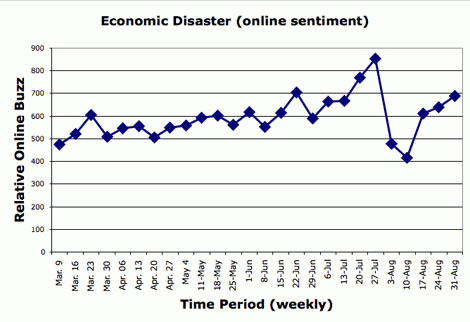Over the weekend Alan Greenspan, former Federal Reserve Chairman, told Bloomberg News that he was "not in favor of financing tax cuts with borrowed money" and that the United States could not afford big tax cuts such as those proposed by Republican John McCain. Alan Greenspan went on to say that the current economic crisis, that began with the collapse of the subprime-mortgage market last year, is so bad that he called it "a once in a century" crisis and will lead to the failure of more firms.
Back in July McCain's own economic advisor Phil Gramm said that the economic troubles and the recession that experts believe we are currently in was only in our minds and that we had become a nation of whiners. Really? I suppose a 300% increase in gas, a 50% increase in milk, and the highest unemployment and foreclosure rates in decades is in our heads as well. We have had more than six months of job losses, which is the worst in 22 years. Yesterday the stock market plunged 504 points making it the sixth biggest one-day loss in our history and it wiped out $700 billion in shareholder wealth. It was the biggest point drop since September 17, 2001, the day stock trading resumed after the September 11 attacks. The fundamentals of our economy are most definitely not strong.
McCain's economic plan caters to wealthy taxpayers and corporations by extending and expanding President Bush's tax cuts, slashing corporate taxes and weakening the estate tax. Never mind that McCain has flip-flopped on his previous position of being a deficit hawk and formerly a critic of the massive tax cuts launched in 2001 by the Bush administration. Now McCain embraces the tax policies of supply-side economists who contend that lifting the tax burden on the rich would encourage investment and stimulate the economy. "Wealth creates wealth," McCain said during a primary debate in Michigan last year.
Why are financial giants like Warrant Buffet and George Soros getting behind Barack Obama and strongly advocating that the Bush tax cuts on the wealthy be reversed? It is because they see where Bush's reckless fiscal policy, which will be continued by Republican John McCain, is taking us. You don’t have to look very hard to see that the "fundamentals" of our economy are NOT strong.
Some on the far-left will say Barack Obama is selling out to the corporate Wall Street types because they are getting behind him. An alternative viewpoint and my viewpoint is they are getting behind Obama because they are scared that this economy is nearing complete collapse. A look at the negative sentiment shows that usage of the phrase "economic disaster" has been rising steadily over the past 6 months (Figure 1).
One of the greatest myths that the Republican party has been able to pull over the eyes of the American public is that they are the party of fiscal restraint and that the economy and the stock market does better under their watch. Like so much of their spin and propaganda the facts just aren’t on their side for this claim. The Nasdaq is still down over 50% from its high of 4572 at the end of 1999 under Bill Clinton's watch and the Dow Jones is testing another low, nearing 11,000, which has evaporated $2.5 trillion from our investment portfolios.
Not everyone on Wall Street believes in unadulterated greed and the doomed policies of unrestrained "Free Markets". Proponents of the "Free Markets" policies believe the government could not possibly run anything efficiently .…. that is until they come to the government with their hands out looking for corporate bailouts or corporate subsidies at the expense of us the taxpayers. "Free Market" policies are nothing more than a scam to privatize profits and socialize risk.
Much of the current Republican attitude, that has led to this mess, started with Ronald Reagan famously saying, "Greed is good". But if any one single event could be most directly linked to the current financial mess it would be the reversal of the Glass-Steagall act back in 1999. Led by the Republican controlled congress Phil Gramm, McCain's current top economic advisor, successfully repealed the Glass-Steagall act of 1933 which was put into place after the "Great Depression" and which established the Federal Deposit Insurance Corporation (FDIC) and provided regulations designed to control dangerous speculation within the banking industry. Phil Gramm was the chief architect for the Gramm-Leach-Bliley Act which repealed much of the Glass-Steagall act and was eventually signed into law by Bill Clinton on November 12th, 1999.
Do we really want a president who yesterday said to an audience in Jacksonville, Florida that the economy is strong on the same day the stock market plunged 504 points and whose top economic advisor thinks the American people should stop whining about their economic woes?





